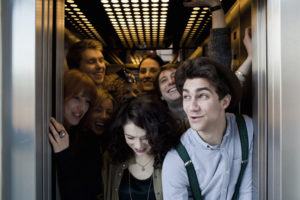What Anthropology Teaches Us about COVID-19, Part 2: An Optimist’s Scenario
Here’s what I imagine could–and should–emerge from this viral nightmare.
Locally, stranger-neighbors will (re)discover each other. Re-appreciate the bonds of co-residence.

- Translate that appreciation into forging new relationships, even new neighborhood groups. Friendly elevator chats, book groups, block parties, children’s after-school clubs.

- Remember that our common humanity unites us more than our cultural differences divide us.
Online, new connections and groups will form.
- In this often scary and lonely world, like-minded folks will find their way online to one another, whether as individuals or in groups.

- A new Facebook group for physicians seeking the latest information about COVID-19 has popped up; as of March 18, it had 14,641 members.
- Another Facebook group of “Artists against COVID-19” is already sharing both critical information, and equally critical (virtual) hand-holding.
- The non-tech-savvy will discover their Inner Geek and figure out how to connect virtually.

Politicians who specialize in policies of the heartless–generously supporting their own kind, and pretending their ilk have a monopoly on being human–will recover their souls.
- Re-learn empathy for anyone other than their immediate families and business associates.
- Translate that empathy for other humans into public policy supporting those other humans.

Globally, political leaders will recognize that it is actually possible to band together with parallel, even coordinated, strategies for the common good.
- Translate that realization into new, viable policies to counteract climate change.
- Embrace the youthful energy of the Sunrise Movement, whose political leader is already calling on Pres. Trump to invoke the Defense Production Act for Planet Earth. That would direct private industry to produce essential equipment to counteract imminent threats–viz., not only the health of our individual lungs, but the health of our collective environment.
- Dismantle the fossil fuel industry.
- Enact international legislation promoting sustainable energy.
- Invest in civic-minded engineers and their research.
- Save the planet.

It’s true that I have a reputation for being a bit of a Pollyana in my family.
Still, even I don’t dare hope that any or all the above will happen overnight. Once the microscopic creatures causing COVID-19 chaos have (mostly) died off, we will need time to remember who we were.
But, also, time to think about who we want to be.
This horrible moment provides an important opportunity for us—as individuals, as communities, as nations, and as a globalized species—to rethink, well, everything.


Love the empathy curve!
Ha, yes, that’s such a simple way to sum up something that really ought to be simple, right?